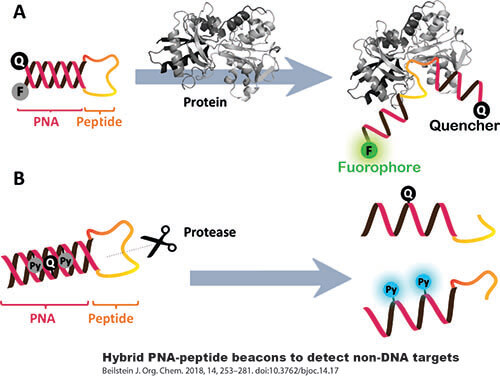Equipped with exceptional cell permeability and a robust affinity for RNA, LifeTein’s Peptide Nucleic Acid (PNA) synthesis service emerges as the premier platform technology, continuously evolving to meet diverse research needs.

Antisense therapy involves introducing artificial nucleic acids into cells, targeting specific regions of pre-mRNA or mRNA to impede the translation of disease-causing proteins. Over the last five decades, scientists have explored various artificial nucleic acids such as phosphorothioate, 2-alkyloxy RNA, morpholino, locked nucleic acid, and siRNA for therapeutic applications. However, due to their poor cell permeability, these attempts have yielded limited success in developing RNA-modulating drugs with practical utility.
Peptide nucleic acid (PNA) represents a novel class of artificial nucleic acids. Despite its favorable properties resembling natural DNA or RNA oligonucleotides, PNA has remained underutilized in therapeutic applications due to its inadequate cell permeability and physicochemical characteristics.
LifeTein’s PNA synthesis service introduces modifications incorporating cell-penetrating peptides or cationic lipid moieties into the PNA sequence. This strategic attachment significantly enhances cell permeability and augments RNA affinity. Endowed with superior membrane permeability and a potent affinity for RNA, LifeTein’s PNA stands out as the optimal platform for artificial nucleic acid therapeutics.
With its potential to readily traverse the cell membrane, LifeTein’s PNA is ideally suited for modulating the splicing process within the nucleus. Moreover, its tight and selective binding to pre-mRNA effectively prevents spliceosome complex formation, facilitating exon skipping at concentrations orders of magnitude lower than other classes of artificial nucleic acids. While LifeTein PNA can also bind to mRNA and inhibit protein synthesis, its mechanism of action on mRNA requires significantly higher concentrations, limiting its therapeutic viability in this regard.
Representing the third generation of antisense nucleic acids, antisense peptide nucleic acid (asPNA) offers enhanced resistance to natural degradation pathways and exceptional affinity and fidelity towards mRNA targets. Unfortunately, similar to DNA/RNA, asPNA faces challenges in cell internalization due to its large molecular weight and lack of positive charges. LifeTein’s modified peptide nucleic acid addresses these challenges with a rationally designed geometry, customizable functionality, and outstanding biocompatibility, promising significant advancements in biomedical applications.
In summary, LifeTein’s PNA synthesis service offers a multifunctional solution for biomedical research. It leverages tailored modifications to enhance cellular uptake, overcome drug resistance, and achieve effective gene silencing, thereby opening new avenues for therapeutic development in various fields, including tumor therapy.
